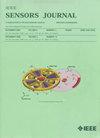Signal-Enhanced Fiber-Optic LSPR Sensor With Hybrid Nanointerface for Ultrasensitive Detection of Putrescine in Low Concentrations
IF 4.3
2区 综合性期刊
Q1 ENGINEERING, ELECTRICAL & ELECTRONIC
引用次数: 0
Abstract
The development of signal enhancement techniques in fiber-optic sensors has facilitated accurate measurements of low-concentration samples. In this article, a fiber-optic sensor based on local surface plasmon resonance (LSPR), which combines offset splicing and S-taper techniques with low-dimensional materials, is proposed for putrescine (PUT) detection. The multimode fiber–single-mode fiber–multimode fiber sliding structure is fabricated by lateral offset technique. In addition, the S-taper is fabricated on the misaligned MMF, which can produce more light energy leakage. Gold nanoparticles (AuNPs), cerium oxide nanorods, and multiwall carbon nanotubes (MWCNTs) are attached to the fiber probe to improve the sensitivity of the fiber-optic sensor and achieve fast sample detection. PUT is detected by specific recognition of the diamine oxidase (DAO). Based on the above two methods, the optical fiber probe is applied to the detection of PUT. The sensitivity of 795.33 pm/求助全文
约1分钟内获得全文
求助全文
来源期刊

IEEE Sensors Journal
工程技术-工程:电子与电气
CiteScore
7.70
自引率
14.00%
发文量
2058
审稿时长
5.2 months
期刊介绍:
The fields of interest of the IEEE Sensors Journal are the theory, design , fabrication, manufacturing and applications of devices for sensing and transducing physical, chemical and biological phenomena, with emphasis on the electronics and physics aspect of sensors and integrated sensors-actuators. IEEE Sensors Journal deals with the following:
-Sensor Phenomenology, Modelling, and Evaluation
-Sensor Materials, Processing, and Fabrication
-Chemical and Gas Sensors
-Microfluidics and Biosensors
-Optical Sensors
-Physical Sensors: Temperature, Mechanical, Magnetic, and others
-Acoustic and Ultrasonic Sensors
-Sensor Packaging
-Sensor Networks
-Sensor Applications
-Sensor Systems: Signals, Processing, and Interfaces
-Actuators and Sensor Power Systems
-Sensor Signal Processing for high precision and stability (amplification, filtering, linearization, modulation/demodulation) and under harsh conditions (EMC, radiation, humidity, temperature); energy consumption/harvesting
-Sensor Data Processing (soft computing with sensor data, e.g., pattern recognition, machine learning, evolutionary computation; sensor data fusion, processing of wave e.g., electromagnetic and acoustic; and non-wave, e.g., chemical, gravity, particle, thermal, radiative and non-radiative sensor data, detection, estimation and classification based on sensor data)
-Sensors in Industrial Practice
 求助内容:
求助内容: 应助结果提醒方式:
应助结果提醒方式:


